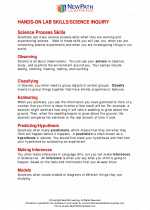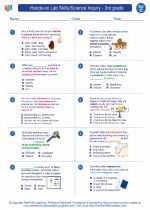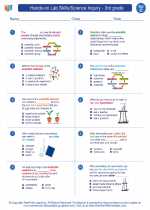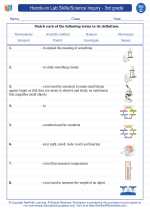Agriculture
Agriculture is the science, art, and practice of cultivating plants and raising animals for food, fiber, and other products used to sustain and enhance human life. It is an essential component of human civilization and has been practiced for thousands of years.
Types of Agriculture
There are various types of agriculture, including:
- Subsistence Agriculture: In this type, farmers grow food crops to feed themselves and their families.
- Commercial Agriculture: Farmers grow crops or raise livestock to sell for profit.
- Organic Agriculture: This type of farming relies on natural processes and avoids the use of synthetic chemicals and genetically modified organisms.
- Intensive Agriculture: This involves high inputs of labor, capital, or heavy usage of technologies such as irrigation and chemical fertilizers to maximize crop yields.
- Extensive Agriculture: This type of farming involves large areas of land and minimal labor and capital inputs per unit of land area.
Main Components of Agriculture
The main components of agriculture include:
- Crop Production: This involves the cultivation of plants for food, fiber, and fuel. Examples of crops include grains, fruits, vegetables, and oilseeds.
- Livestock Production: This involves raising animals for meat, milk, eggs, and other products. Common livestock animals include cows, pigs, chickens, and sheep.
- Agribusiness: This includes the various businesses and industries involved in agricultural production, such as machinery, seed, and fertilizer companies, as well as food processing and distribution.
- Agricultural Technology: This encompasses the use of modern tools and techniques, including genetic engineering, precision farming, and agricultural drones, to improve efficiency and productivity in agriculture.
- Sustainable Agriculture: This refers to farming practices that aim to sustainably manage resources and minimize environmental impact while meeting the needs of the present and future generations.
Importance of Agriculture
Agriculture is vital for several reasons:
- It provides food and nutrition for the growing global population.
- It contributes to the economy by creating jobs and supporting various industries.
- It helps preserve natural habitats and biodiversity.
- It plays a crucial role in addressing climate change and environmental sustainability.
Study Guide
If you are studying agriculture, here are some key points to focus on:
- Understand the different types of agriculture and their characteristics.
- Learn about the main components of agriculture, including crop and livestock production, agribusiness, agricultural technology, and sustainable practices.
- Explore the importance of agriculture in providing food, contributing to the economy, and promoting environmental sustainability.
- Consider the challenges and opportunities facing modern agriculture, such as food security, climate change, and technological advancements.
By understanding these key concepts, you will gain a comprehensive overview of the important role that agriculture plays in our world.
.◂Science Worksheets and Study Guides Third Grade. Hands-on Lab Skills/Science Inquiry - 3rd grade
Study Guide Hands-on Lab Skills/Science Inquiry - 3rd grade
Hands-on Lab Skills/Science Inquiry - 3rd grade  Worksheet/Answer key
Worksheet/Answer key Hands-on Lab Skills/Science Inquiry - 3rd grade
Hands-on Lab Skills/Science Inquiry - 3rd grade  Worksheet/Answer key
Worksheet/Answer key Hands-on Lab Skills/Science Inquiry - 3rd grade
Hands-on Lab Skills/Science Inquiry - 3rd grade  Worksheet/Answer key
Worksheet/Answer key Hands-on Lab Skills/Science Inquiry - 3rd grade
Hands-on Lab Skills/Science Inquiry - 3rd grade  Worksheet/Answer key
Worksheet/Answer key O-W-L
O-W-L  Vocabulary/Answer key
Vocabulary/Answer key Hands-on Lab Skills/Science Inquiry - 3rd grade
Hands-on Lab Skills/Science Inquiry - 3rd grade  Vocabulary/Answer key
Vocabulary/Answer key Hands-on Lab Skills/Science Inquiry - 3rd grade
Hands-on Lab Skills/Science Inquiry - 3rd grade 

 Worksheet/Answer key
Worksheet/Answer key
 Worksheet/Answer key
Worksheet/Answer key
 Worksheet/Answer key
Worksheet/Answer key
 Worksheet/Answer key
Worksheet/Answer key
 Vocabulary/Answer key
Vocabulary/Answer key
 Vocabulary/Answer key
Vocabulary/Answer key

The resources above cover the following skills:
Science as Inquiry and Process: A student should understand and be able to apply the processes and applications of scientific inquiry. A student who meets the content standard should:
Develop an understanding of the processes of science used to investigate problems, design and conduct repeatable scientific investigations, and defend scientific arguments.